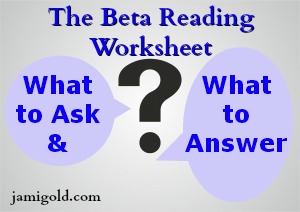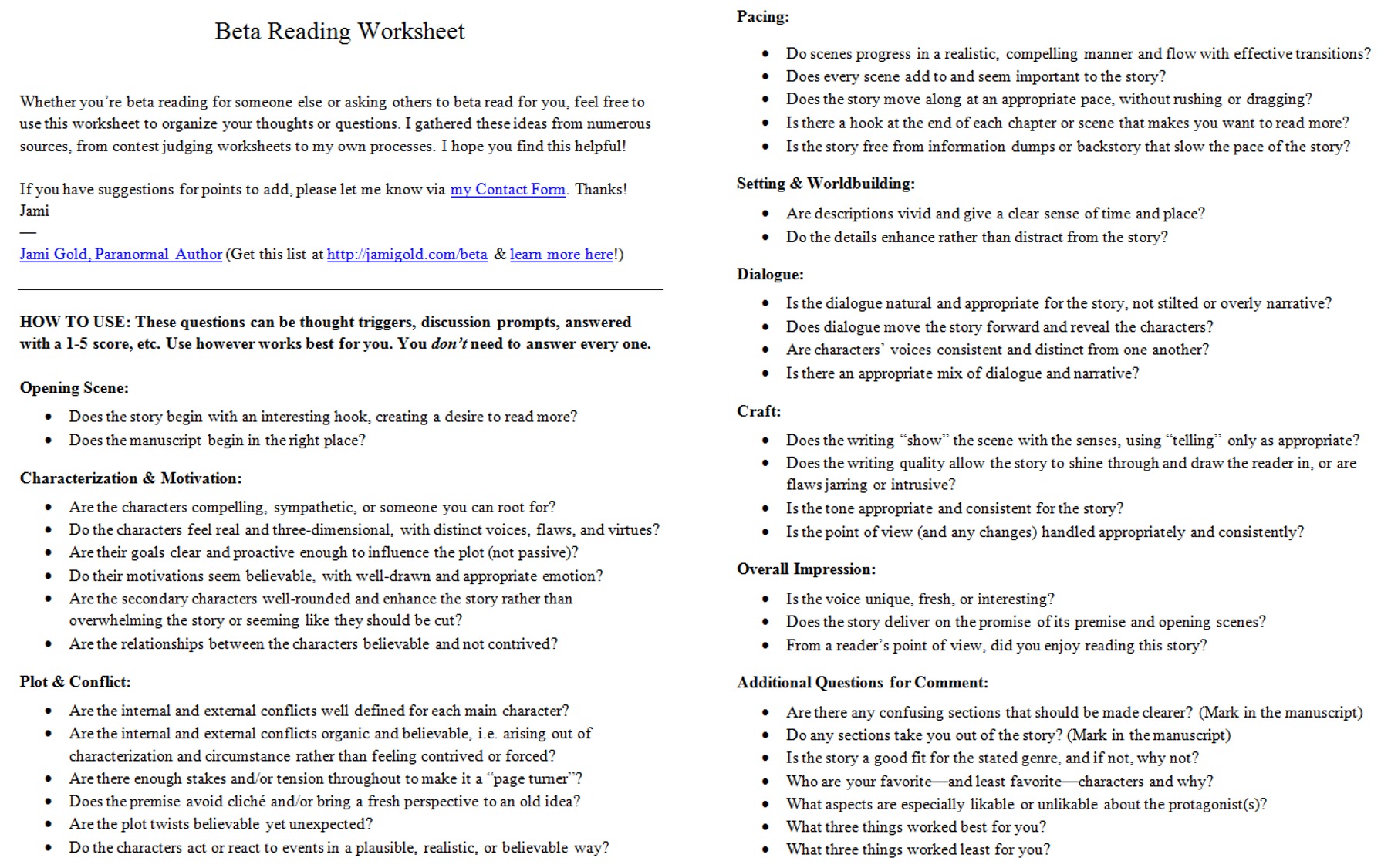This past weekend, I guest blogged at Anne R. Allen’s site with a post about beta readers: where to find them and how to keep them. The guest post built off several articles I’ve shared here on my blog, such as my suggestions of how to find beta readers and my advice about being a good beta reader ourselves.
As I mentioned in the guest post, many of us find beta readers by offering to exchange our work with other writers in a “I’ll give you feedback if you give me feedback” arrangement. That structure means we have to do a good job with our feedback if we want to continue our beta buddy exchange program.
A Bad Beta Reader…
One commenter on my guest post at Anne’s blog wondered if much of the advice is just common sense. Well…yeah. *smile*
Giving the type of feedback we’d like to receive is like a writers’ version of the Golden Rule. Unfortunately, common sense isn’t as common as it should be.
Virtually every writer who’s received critique partner or beta reader feedback (and sometimes this includes feedback from supposedly professional editors) has horror stories. Most of us have come across critiquers who insult us and/or our writing. Or those who try to steamroll our voice or rewrite the story to match their vision.
Those horror stories are shockingly common. So “common” sense? Nope.
And then there are the flat-out unethical critiquers Jordan McCollum posted about last week. I’m appalled at the behavior Jordan pointed out as happening to her or those she knows.
I hope we’re all in agreement that it would be unethical to:
- withhold feedback from the author and then trash it in an online review after it’s released, or
- negatively review a book we’ve beta read without reading the final version to see if the issues were resolved, or
- engage in any of the other points she makes in her post.
Agreed? Good.
A Good Beta Reader…
Yet, just as harsh criticism isn’t helpful because it discourages and causes defensiveness, false compliments aren’t helpful either. So how can we be honest about things we don’t like without being mean?
Author Connie Flynn advises that we should avoid “Why did you…?” feedback comments. Why questions along those lines tend to put people on the defensive. She instead shares these excellent suggested critique phrases:
- I don’t understand…(whatever it is).
- The detail seems…(to slow the pace, insufficient, whatever).
- The…(character, setting, etc.) is coming across…(feisty, depressing, important, etc.). Is that what you intended?
- Did you want to convey (irritation, happiness, whatever)?
- How did…(Sally get to the store, John saw down the tree, etc.)? (Use to point out missing information.)
- Wouldn’t a character…(who has such and such a trait) do or not do…(such and such)? (Use to point out inconsistent behavior.)
- Wasn’t…(John a blue-eyed man, Sally submissive, etc.) in Chapter (xxx)? (Use to point out inconsistent information.)
- Carol’s (goal) seems to be… . Is that correct?
- Your story question seems to be… .
- I’m confused about John’s motivation.
- And most important . . . I really liked… . (end on a strength)
These phrases echo many I’ve used over the years, and I haven’t had anyone tell me yet that I’m too harsh, so… *smile* They seem like good suggestions to me.
What If We Don’t Know What to Look For or Ask About?
When we first start beta reading, we might not know what kind of feedback is possible or appropriate, and I wondered if a cheat sheet of what to look for might be helpful. Enter my friend Shelly Chalmers, who sent me a “beta reading worksheet” she’d downloaded from an RWA forum, which I recognized as the judging scoresheet from RWA’s Fantasy, Futuristic, and Paranormal chapter’s On the Far Side contest (one I’ve judged several times).
I’ve mentioned before that RWA members have the benefit of a large variety of writing contests, especially compared to other genres. These contests are generally well run and use scoresheets to assist judges with objective scoring and feedback.
In other words, these scoresheets contain a couple dozen questions probing the writing quality and storytelling craft of a contest entry. Sounds like a good start for analyzing stories of a beta read, doesn’t it?
Maybe when we beta read, we’re not sure what to look for or comment on. Or maybe when we request a beta read, we’re not sure what questions to ask our beta readers. To that end, I took the idea borne from Shelly’s email and the RWA forums and put it on steroids. *grin*
I’ve entered and judged a lot of contests, so I had over a dozen scoresheets from which to grab ideas. With profound thanks to RWA and its chapters for the original scoresheets, I took pieces and parts and merged them into a new creation, a single Frankenstein listing of points to consider for a beta read.
Introducing the Beta Reading Worksheet!
First, a note that this worksheet should not feel like an obligation, nor is it meant as an all-inclusive list of every question possible. Instead, these questions are meant merely to trigger thoughts of what worked and what didn’t. Depending on our process, we might even be able to use this worksheet for self-editing by gaining insights into the areas to study and improve.
For more of that “common” sense…
- If this doesn’t work for you, don’t use it.
- If you instinctively know how to approach all but one area of analysis, it’s okay to look at just that one section for ideas.
- In short, as with all things related to feedback, take what works for you and ignore the rest.
(click on the image to zoom)
Click to download the Beta Reading Worksheet — MS Word ’07 version (.docx)
Click to download the Beta Reading Worksheet — MS Word earlier version (.doc)
On contest scoresheets, questions like these are typically answered with a score of 1 to 5 to come up with an entry’s ranking:
- Needs Extensive Work
- Fair
- Good
- Very Good
- Excellent
Of course, we can use these questions however we want, as a checklist of things to think about, a master list of questions we could ask, or any other of a dozen uses. Remember, this is a tool, not necessarily a to-do list.
Personally, I wouldn’t send this whole list to a beta reader because it could be overwhelming and distract their big-picture reading. Instead, I’d ask a few overview questions (like from the last section about marking issues). Then if the beta reader requested more direction after they were done reading, I might send this sheet or a good portion of it. For me, I want my beta readers to use these questions only to organize their thoughts, not to direct their reading—but my goals are not necessarily your goals.
Hopefully, Connie’s suggestions above and this worksheet will help those of us who struggle with knowing what to say and how to say it. And don’t forget to check out my guest post at Anne R. Allen’s blog with more beta-reading tips. With any luck, we’ll be able to keep the writing and beta-reading communities helpful and encouraging. *smile*
Do you have horror stories of bad or unethical beta readers? Or have you heard from others with those stories? What do you think of Connie’s comment wording suggestions? Do you struggle with knowing what to ask your beta readers or knowing what to comment on when you beta read? Will this worksheet be helpful?
P.S. Don’t forget to check out my other helpful writing worksheets.


